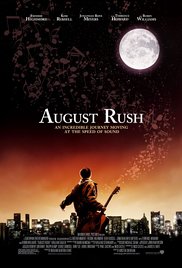 You’re a heartless, soulless bastard if you don’t like “August Rush.” The story of an orphan whose parents don’t even know he exists, who uses his natural gift for music to call his musician parents to him? That has “heart-warming tearjerker” written all over it, what’s wrong with you? For the record, there is nothing wrong with you. “August Rush” is brimming with potential – the lead, after all, is Freddie Highmore, the Cutest Kid on the Planet – but the movie is undone by a complete lack of confidence in the story they’re telling. I can’t remember the last time I saw a movie hedge its bets so frequently, and for no reason.
You’re a heartless, soulless bastard if you don’t like “August Rush.” The story of an orphan whose parents don’t even know he exists, who uses his natural gift for music to call his musician parents to him? That has “heart-warming tearjerker” written all over it, what’s wrong with you? For the record, there is nothing wrong with you. “August Rush” is brimming with potential – the lead, after all, is Freddie Highmore, the Cutest Kid on the Planet – but the movie is undone by a complete lack of confidence in the story they’re telling. I can’t remember the last time I saw a movie hedge its bets so frequently, and for no reason.
Highmore is Evan Taylor, an orphan who can hear music in literally everything around him. This makes sense, given that his parents are concert cellist Lyla (Kerri Russell) and Irish pub rocker Louie (Jonathan Rhys Meyers). The problem is that his parents were only together for one night, and quickly torn apart by Lyla’s controlling father (William Sadler). In fact, Louie doesn’t even know that he’s a father. Even stranger, Lyla doesn’t know she’s a mother: she thought she lost her then-unborn child in a car accident 11 years earlier, but her deathbed-repentant father finally confesses to giving the baby up for adoption so she could focus on her career. Mom, Dad and son are all drawn to New York City – the scene of the crime, as it were – but before Evan finds his parents, he finds a father figure in Wizard (Robin Williams, dressed like a dumpster-diving Bono), a musical pimp to a group of homeless children who busk on various street corners and give Wizard the bulk of their earnings. Wizard’s eyes turn into Tex Avery dollar signs when he witnesses Evan’s newfound musical abilities, and suggests that he change his name to August Rush, because it’ll look good on a marquee. He has a more sinister motive for this name change as well: he knows people are looking for Evan and he wants to protect his investment, with no regard for Evan’s ‘are you my mommy?’ plan.
Everyone involved with the production is partially responsible for the movie turning out so poorly. The editor didn’t seem to notice that he put footage of Highmore striking a piano key, then hitting a higher key, to the sound of him striking a key, then hitting a lower key. The complicated piano bits are clearly played by a set of hands a good ten years older than Highmore’s. The screenplay, by Nick Castle and James V. Hart, is so focused on August that it never makes a convincing argument for why his parents got together in the first place. The implication is that it was a mutual love for Van Morrison’s “Moondance” – if Mark Mancina’s score is any indication – but Lyla doesn’t really express any love or lack thereof for the song. Additionally, the writers are so in love with the fantastical nature of their story that they forget to ground the movie in any way, and as a result August is not eccentric so much as he’s flaky.
In the end, the hammer falls on director Kirsten Sheridan – her father is “In the Name of the Father” director Jim Sheridan – for she is guilty of multiple infractions. She elicits too little from one half of the cast and too much from the other (one guess which side Robin Williams is on), she implements far too much narration, a telltale sign that the filmmakers aren’t sure they are properly conveying their message. Her camera technique is woefully lacking in personality, and lastly, while we all know that Russell has hair to die for, there is no way that Lyla plays the cello with her hair down. Sheridan has Russell’s locks cascading down on her instrument, begging to get tangled up in the strings. Russell looks lovely, but the scene looks ridiculous.
“August Rush” has too much talent and potential in its grasp for it to turn out this way. Despite being so poorly made, I was still prepared to weep like a baby at the inevitable reunion scene, and they even screwed that up. Tragic.
 (2 / 5)
(2 / 5)
This originally ran November 21, 2007 on Bullz-Eye.com.



